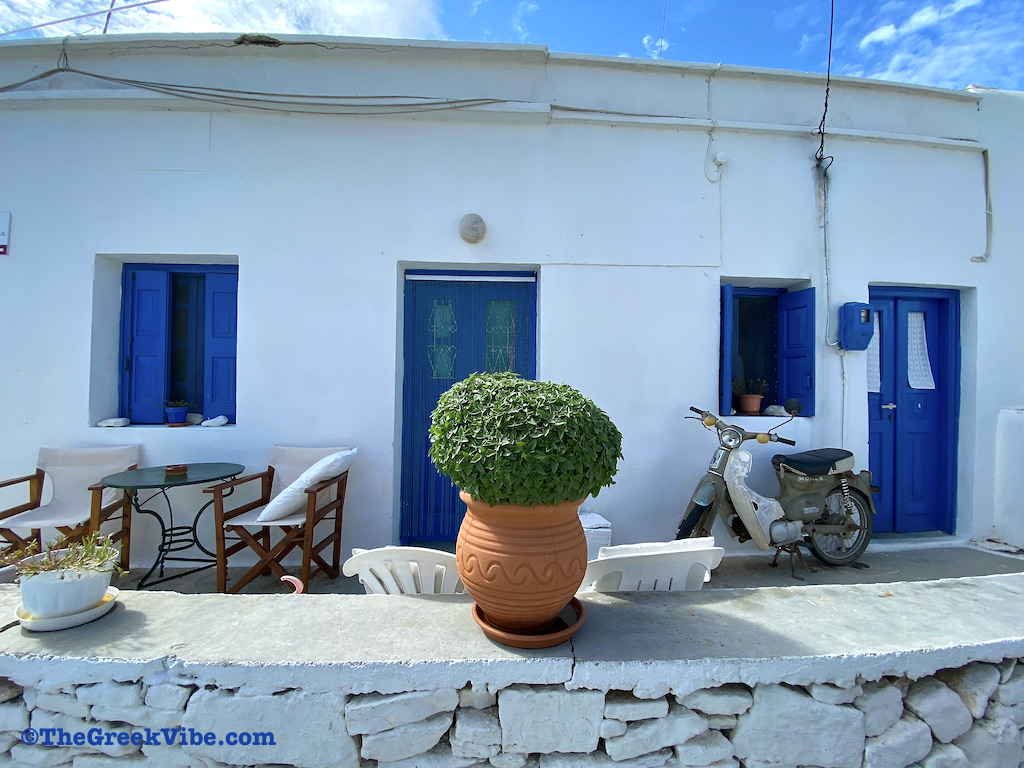
There, in every Greek yard, on every porch, in every garden, on every window sill, outside the door, on every balcony – large or small, stands a proud basil plant.
There can be no Greek summer without a bright green basil plant sending off its fragrance, its charm, and its promise of wellness and good fortune.
That is why you’re bound to see a happy basil plant in nearly every picture you take in Greece, just there, an integral part of the destination.
The Basil Plant & The Orthodox Church
Besides its central role in Greek summer, the basil plant in Greece has an added significance. It is a sacred herb that made its way from far off India to Greece after Saint Helen, the mother of Emperor Constantine the Great, in her quest for the buried Holy Cross stepped on a basil plant. So taken was she by the aroma that she had her servants dig on the spot only to find the true cross. She named the unknown flower “vassilikos”, which means “king” or “flower of royalty” and every year since, on September 14, in Greece we mark the “Elevation (Exaltation) of the Holy Cross” – one of the Great Feasts of the Greek Orthodox Church. All this happened in Jerusalem at around 325 AD.
If you attend a Greek church service you are bound to see the priest holding some basil which he uses during the blessing service or “agiasmos” to ward off evil and “refresh” with love and light, health and prosperity.
Basil & Greek Cuisine

There is no feeling more rewarding for a cook than being able to open the door and pick a herb fresh, straight from the garden and add it to the magic dish! And that’s exactly what Greeks do with “vassiliko” and with “rigani” (oregano).

The culinary herb, part of the mint family is a basic in the Mediterranean diet and in Greek cuisine with dozens of basil varieties each used depending on dish, season, and desired taste.
Among the annual and perennial varieties found in Greece are the wide leaf (platifyllos), the curly (sgouros), the large leaf (megalofyllos), sweet basil and the purple-leaved melanofyllos.
And of course, according to my grandmother, you never forget to plant some basil next to your tomatoes and eggplants (“melitzanes”) in your veggie garden.
►Greek Music 101
The Basil Plant in Greek Song
And yes, even here, in Greek music basil takes the spotlight. There are dozens of Greek songs dedicated to the “vassilikos” and with a variety of meanings.
In Greek folk tradition, the “vassilikos” stands for the beloved female but also due to its fragrance and popularity – like we said earlier, found on all window sills – it’s the closest one can get to their loved one.
This traditional song from Epirus, northern Greece, says exactly that: “Vassilikos tha Gino sto Parathyri Sou” about a man’s desire to be so close to his loved one, that he wished he could be a basil plant on the window sill.
A Cretan “mantinada” (a traditional song in rhyming verse) version tells the story of a man who envies the basil plant… not due to its intoxicating fragrance, but because it sits so near his loved one, in the house!
Moving to the Cyclades, one of my favorite singers, Yiannis Parios (from the island of Paros) here with the wonderful Eirini Konitopoulou (from the island of Naxos) perform a favorite Cyclades island song about the “curly” vassilikos ….of his heart who torments him.
► Five Ways to Boost Your Health Greek-style
Basil & Health

Besides being packed with vitamins – K, A, and C – and a wonderful source of zinc, calcium, magnesium, potassium and dietary fibre, the basil plant is also known for its antioxidant properties.
According to ancient father of medicine, Hippocrates, who was born on the Greek island of Kos by the way, drinking a bit of basil as a tonic could do wonders for the heart and the stomach.
But basil’s therapeutic effects don’t stop there. The aromatic herb – its extracted oils – was also used to heal wounds, cuts and skin infections too,
➢ The Greek Vibe ‘Vassilikos’ Trivia
And just to make sure the deceased traveled well into the after life and heaven, the ancient Greeks were said to have placed a bunch of basil in the hands of the departing. Off you go! Safe travels my dearest.
►Koliva: The Symbolism of a Greek Delicacy Made for the Dead
♪ And on this note, I end today’s post with one of my favorite international Greek stars, Nana Mouskouri performing a song by Greek poet Nikos Gatsos to the music of Giorgos Hadjinasios: “Yiarem – Yiarem” about how God adorned the world with basil and mint.
Enjoy!





How interesting, thanks for sharing!
Happy to hear that. Thank you for reading.
This is such an interesting read! I never realised how important basil was for Greek culture and neither did I realise that there were different varieties.
Basil is more important culturally for the Greeks than it is in their food. We have so many songs and poems about basil and love and travel. Glad you enjoyed it!
Nice, I love basil but I didn’t know about its importance in Greek Orthodox religion and cuisine. By the way, my boyfriend’s name is Basil haha!
Yes, it truly is. Like I said there are so many songs and poems featuring basil, besides it’s presence in our food. As for your boyfriend… lucky you! “Basil” in Greek forms the word “vassilikos” which means “kingly”!
Really interesting post. Greek food is so delicious and fresh! Love the info about basil in the songs!
Thanks, good to hear you enjoyed it!